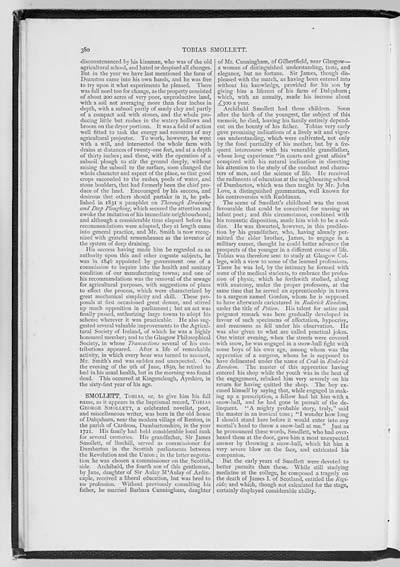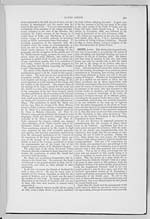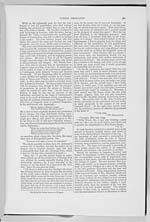Volume 3 > Half-Volume 6
(26) Page 380 - Smollett, Tobias
Download files
Individual page:
Thumbnail gallery: Grid view | List view

380 discountenanced by his kinsman, who was of the old agricultural school, and hated or despised all changes. But in the year we have last mentioned the farm of Deanston came into his own hands, and he was free to try upon it what experiments he pleased. There was full need too for change, as the property consisted of about 200 acres of very poor, unproductive land, with a soil not averaging more than four inches in depth, with a subsoil partly of sandy clay and partly of a compact soil with stones, and the whole pro- ducing little but rushes in the watery hollows and broom on the dryer portions. It was a field of action well fitted to task the energy and resources of any agricultural projector. To work, however, he went with a will, and intersected the whole farm with drains at distances of twenty-one feet, and at a depth of thirty inches; and these, with the operation of a subsoil plough to stir the ground deeply, without raising the subsoil to the surface, soon changed the whole character and aspect of the place, so that good crops succeeded to the rushes, pools of water, and stone boulders, that had formerly been the chief pro- duce of the land. Encouraged by his success, and desirous that others should partake in it, he pub- lished in 1831 a pamphlet on Thorough Draining and Deep Ploughing, which secured the attention and awoke the imitation of his immediate neighbourhood; and although a considerable time elapsed before his recommendations were adopted, they at length came into general practice, and Mr. Smith is now recog- nized with grateful remembrance as the inventor of the system of deep draining. His success having made him be regarded as an authority upon this and other cognate subjects, he was in 1846 appointed by government one of a commission to inquire into the health and sanitary condition of our manufacturing towns; and one of his recommendations was the removal of the sewage for agricultural purposes, with suggestions of plans to effect the process, which were characterized by great mechanical simplicity and skill. These pro- posals at first occasioned great demur, and stirred up much opposition in parliament; but an act was finally passed, authorizing large towns to adopt his scheme wherever it was practicable. He also sug- gested several valuable improvements to the Agricul- tural Society of Ireland, of which he was a highly honoured member; and to the Glasgow Philosophical Society, in whose Transactions several of his con- tributions appeared. After a life of remarkable activity, in which every hour was turned to account, Mr. Smith's end was sudden and unexpected. On the evening of the 9th of June, 1850, he retired to bed in his usual health, but in the morning was found dead. This occurred at Kingencleugh, Ayrshire, in the sixty-first year of his age. SMOLLETT, TOBIAS, or, to give him his full name, as it appears in the baptismal record, TOBIAS GEORGE SMOLLETT, a celebrated novelist, poet, and miscellaneous writer, was born in the old house of Dalquhurn, near the modern village of Renton, in the parish of Cardross, Dumbartonshire, in the year 1721. His family had held considerable local rank for several centuries. His grandfather, Sir James Smollett, of Bonhill, served as commissioner for Dumbarton in the Scottish parliaments between the Revolution and the Union; in the latter negotia- tion he was chosen a commissioner on the Scottish side. Archibald, the fourth son of this gentleman, by Jane, daughter of Sir Aulay M'Aulay of Ardin- caple, received a liberal education, but was bred to no profession. Without previously consulting his father, he married Barbara Cunningham, daughter of Mr. Cunningham, of Gilbertfield, near Glasgow� a woman of distinguished understanding, taste, and elegance, but no fortune. Sir James, though dis- pleased with the match, as having been entered into without his knowledge, provided for his son by giving him a liferent of his farm of Dalquhurn; which, with an annuity, made his income about �300 a year. Archibald Smollett had three children. Soon after the birth of the youngest, the subject of this memoir, he died, leaving his family entirely depend- ent on the bounty of his father. Tobias very early gave promising indications of a lively wit and vigor- ous understanding, which were cultivated, not only by the fond partiality of his mother, but by a fre- quent intercourse with his venerable grandfather, whose long experience "in courts and great affairs" conspired with his natural inclination in directing his attention to the study of the conduct and charac- ters of men, and the science of life. He received the rudiments of education at the neighbouring school of Dumbarton, which was then taught by Mr. John Love, a distinguished grammarian, well known for his controversies with Ruddiman. The scene of Smollett's childhood was the most favourable that could be conceived for nursing an infant poet; and this circumstance, combined with his romantic disposition, made him wish to be a sol- dier. He was thwarted, however, in this predilec- tion by his grandfather, who, having already per- mitted the elder brother, James, to engage in a military career, thought he could better advance the prospects of the younger in a different course of life. Tobias was therefore sent to study at Glasgow Col- lege, with a view to some of the learned professions. There he was led, by the intimacy he formed with some of the medical students, to embrace the profes- sion of physic, which he forthwith studied, along with anatomy, under the proper professors, at the same time that he served an apprenticeship in town to a surgeon named Gordon, whom he is supposed to have afterwards caricatured in Roderick Random, under the title of Potion. His talent for satire and poignant remark was here gradually developed in favour of such specimens of affectation, hypocrisy, and meanness as fell under his observation. He was also given to what are called practical jokes. One winter evening, when the streets were covered with snow, he was engaged in a snow-ball fight with some boys of his own age, among whom was the apprentice of a surgeon, whom he is supposed to have delineated under the name of Crab in Roderick Random. The master of this apprentice having entered his shop while the youth was in the heat of the engagement, rebuked him very severely on his return for having quitted the shop. The boy ex- cused himself by saying that, while engaged in mak- ing up a prescription, a fellow had hit him with a snow-ball, and he had gone in pursuit of the de- linquent. "A mighty probable story, truly," said the master in an ironical tone; "I wonder how long I should stand here before it would enter into any mortal's head to throw a snow-ball at me." Just as he pronounced these words, Smollett, who had over- heard them at the door, gave him a most unexpected answer by throwing a snow-ball, which hit him a very severe blow on the face, and extricated his companion. But the early years of Smollett were devoted to better pursuits than these. While still studying medicine at the college, he composed a tragedy on the death of James I. of Scotland, entitled the Regi- cide; and which, though not calculated for the stage, certainly displayed considerable ability.
Set display mode to:
![]() Universal Viewer |
Universal Viewer | ![]() Mirador |
Large image | Transcription
Mirador |
Large image | Transcription
Images and transcriptions on this page, including medium image downloads, may be used under the Creative Commons Attribution 4.0 International Licence unless otherwise stated. ![]()
| Biographical dictionary of eminent Scotsmen > Volume 3 > Half-Volume 6 > (26) Page 380 - Smollett, Tobias |
|---|
| Permanent URL | https://digital.nls.uk/74514326 |
|---|---|
| Attribution and copyright: |
|
| Description | Volume III. Contains names alphabetically from Macadam to Young. |
|---|

